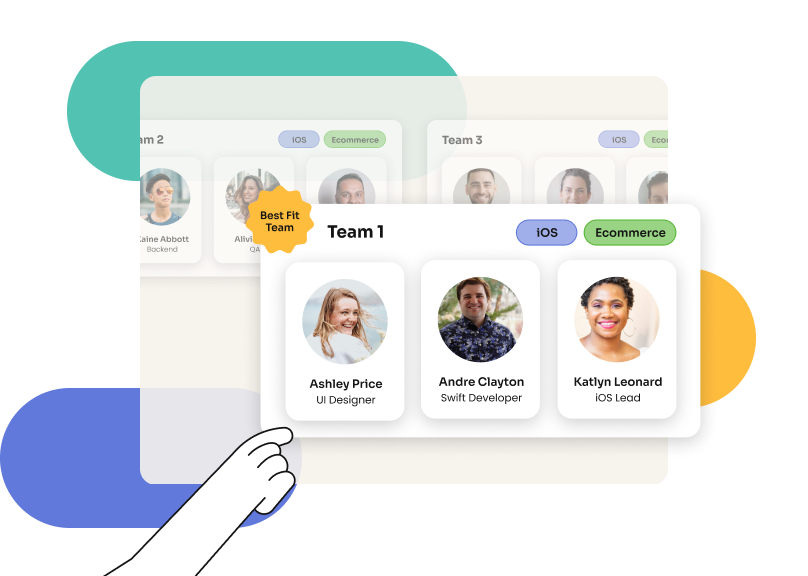Plug vetted, specialist PHP developers into your squad, flexibly!
- ISO27001 Certified
- Vetted Teams
- Risk Free Intro Period

We support companies like



Also featured in




Deliver roadmap with intelligently built PHP dev squads.
Start delivering your digital projects with vetted, certified PHP developers and development teams.
Onboard a team that suits you in as little as 2 weeks, with access to 5000+ pre-screened experts, and never worry about capacity or capability again.
Our developers are typically placed on a 3, 6 or 12 month basis with discounts for longer commitments.
Fast, Easy
Hiring
Start working with vetted PHP
developers in just 2 weeks.
We take the guesswork out of hiring flexible talent. Deliver your digital roadmap even fast, with intelligent matching powered by our own platform.
Top Quality
Developers
We believe in quality over quantity, when
finding you PHP developers.
Our dedicated in-house team screens, vets and onboards each developer before they can submit any project briefs. This means you only see the best of the best.
Ensuring the Right Fit
at Every Step
At Deazy we provide more than just
expert PHP developers.
Our experienced UK team oversees each project delivery ensuring everything runs smoothly. With decades of experience across dozens of industries, no project is too ambitious for us.
Trusted overtime
"The quality and flexibility of development teams from Deazy have helped support us across multiple product roadmaps."

Colin Woods
CTO, RAC"We just told Deazy what we wanted, and they've given us the solution. We tried a few different options, and Deazy was the strongest candidate."

Laing O’Rourke
CXO"We saw a 6x increase in our digital product delivery velocity. Working with Deazy allowed us to increase the overall quality of our digital products and made it easier for us to manage all of our systems as our business grew."

Elliot Gold
Co-founder, Work.life"Deazy’s speed is something we were really impressed with - being able to spin up a cross-functional team in a matter of days."

David Rowe
CTO, Deltabase"[Deazy] deliver on time and stay within budget. Their quality of work is excellent."

Marc Narbeth
Director, Fast Keys Services"The quality of the team's performance, what they could deliver for us, and the service that we got from the account team were their outstanding attributes. They became part of our cross-functional team."

Ian Nutt
Delivery Director, Kin + CartaHiring PHP developers from Deazy
Is Easy!
01
Initiate the process by providing your project details.
Fill out our simple on-site briefing flow and chat through your
requirements with a helpful member of the Deazy team.
02
Receive project proposals and estimates via our platform.
View your project estimate, screen potential candidates and find the
perfect dev talent via Deazy’s automated platform.
03
Project commencement!
Get a PHP developer or whole team working on your project in as little as
two weeks. Now all you have to do is sit back, relax and watch Deazy
do what we do best - making development easy!
Find a developer for your project
What is PHP?
PHP is probably one of the most well-known programming languages outside the developer community. Its prevalence on the web means many people talk about it, without even knowing what it is. Although it has not always meant the same thing, today it stands for PHP: Hypertext Preprocessor.
PHP is an Open-Source back-end technology that allows websites and applications to integrate seamlessly with databases and other scripting tools. This provides the backbone of interactivity on the web, and arguably the backbone of the internet itself.
The usual definition for PHP is that it is a general-purpose scripting language. People sometimes assume that it’s only use is in web development, however this is not actually the case. As a server-side programming language it is indeed ideally suited to web development, however it can also be used to create software systems, content management systems, customer relationship managers and many more software applications.
As PHP can be embedded with HTML (the language of the web), it has remained immensely popular with developers and project managers whenever database integration for applications or websites is involved.
Although PHP can be added to HTML (changing the file to .php from .html in the process), they are different and do not serve the same function. HTML Files are rendered by a web browser. This means that visiting a website prompts a browser to read the HTML as the website loads. PHP on the other hand is server-side, which means that the code is executed on the server with just the result of the code being returned to the browser with all the programming already done.
This means that none of the PHP code from the PHP files is visible to the browser or the viewer. Instead only the result of the code run is shown. As well as integrating with many databases, PHP also supports other front end scripting languages such as JavaScript and CSS.
PHP was created clearly early on in the history of web programming, initially launched in 1994. The language went through several iterations and naming conventions until 2004 with the release of PHP 5 which was a major update and is still the basis of later versions. The current version is PHP 8 and with continual development assured into the future it will not be the last.
Even as early as 2004 the PHP development team included developers working on both the main project and supporting projects, as well as documentation. This has led to the development of a whole underlying infrastructure on hundreds of web servers all over the world.
The latest W3techs figures show that around 78% of the top 10 million websites globally use PHP, with over 20% still on version 5 and 70 percent on version 7. This shows clearly that there are a huge number of businesses and organisations whose online presence relies on PHP and PHP developers.
Some of the most recognisable websites using PHP in some part as their back end technology are;
- Facebook.com.
- Wikipedia.org
- Indeed.com
- CoinMarketCap.com.
- Etsy.
- Mailchimp
- BBC.co.uk
- Bloomberg.com
There is a list of 26 billion+ websites known to use PHP on the BuiltWith website (source) which shows just how prevalent PHP as a back end technology on the web is in 2022 and beyond.
As indicated above PHP is extremely popular and long-lived. When a technology lasts a long time in a fast paced environment (like the internet) there is usually a good reason. PHP is almost 30 years old and has been in continual development for all that time.
This maturity means that today’s PHP developers reap the benefit of multitudes of simple pre-existing PHP based solutions that are tried and tested as well as the continuing release of new resources and ready made functionalities.
Simplicity
PHP is widely used and fantastically documented. Once mastered, the language becomes simple to use and is friendly for beginners while being powerful enough for professional developers to create complex, dynamic and powerful websites and applications or simple interactive web pages with the same programming skills.
Flexibility
PHP can be used with any operating system, multiple servers and databases, as well as being able to integrate with other programming languages. Creating dynamic interactive web pages from existing static HTML content is possible by just the addition of PHP within the page.
PHP can handle images, and provides optimised images to users depending on the device they use. It can also manage forms, serve dynamic web pages, send email, assist cookie control and encrypt services, making it a super-flexible programming language.
Compatibility with all servers
When deploying on cloud servers like AWS and traditional web hosting servers running Linux, Apache, IIS etc, PHP is compatible by design. It runs efficiently no matter what server-side technology is in use.
Database Compatibility
Whether MySQL, MongoDB, MariaDB or any other database, PHP connects easily. Regardless of whether a database is relational or non-relational, PHP speedily connects almost instantaneously.
100% Open Source
Open Source brings cost benefits to a project and is budget friendly. The open-source model is tried and tested with large communities of developers providing enhancements in functionality and resources on a continual basis.
The PHP community is extremely active and mature, having been around for such a long time. This helps ensure that PHP remains stable and secure in a way that proprietary products and services cannot hope to achieve.
Speed
An often cited benefit of PHP for web users is speed, google for instance places great value on website speed and web users continually say that slow websites are one of their pet peeves. Since turning visitors into customers and retaining customers is one of the key aims of most websites, speed is extremely important.
PHP is quick, it has super fast data processing and its tight integration with other back end and front end technologies ensures lightning fast turnaround times. Most surveys show that PHP handles up to 4000 requests per second, this of course will be dependent upon the application being tested and the servers used. However, it is important to note that if PHP is built badly, like any platform, it can be slow.
Whether a project is as extensive as the WordPress content management system or a fully dynamic financial trading board pulling data from around the web and instantly transforming it for browsers and viewers, PHP has it covered.
PHP powers a large part of the web, within that arena there are an equally vast number of different applications being powered by it. PHP developers create and maintain software and applications for the web and other environments.
This leads to PHP developers developing specialties within the language itself. For instance, there are multiple content management systems (CMS) available for businesses to use as the base of their web presence and most of the biggest names are based on PHP. CMS’s such as…
- WordPress – Blogging and website creation platform with extensibility.
- Magento – Full CMS with a focus on eCommerce.
- Adobe Commerce - Proprietary eCommerce CMS.
- Drupal – Website platform used by many Government and nonprofit organisations.
- Joomla – CMS Particularly popular in education settings and learning.
There are PHP developers who specialise in these platforms as well as many other PHP based products. For many of these PHP based products, there are now whole separate communities of developers specialized in these PHP based CMSs. A quick search for “WordPress developers” or “Magento developers” shows just how specialised the marketplace can be.
A vetted and accredited PHP developer, whether focused on a single product or not, is fluent in the language. This expertise adds value to projects ensuring an efficient development workflow focused on the desired outcome. They have experience of any integrations and understand how the programming language works across multiple platforms.
PHP developers can help with planning projects too. Every language has its nuances, their knowledge and insights of challenges and roadblocks, specific to using PHP, are invaluable to the successful delivery of projects. Having knowledge of the ready-made modules available can save both time and money over the span of a build.
PHP continues to be one of the most used technologies, especially on the web. This means the demand for high quality developers is high. Due to PHP being extremely common in back-end services across the web, cloud computing and commercial products, the competition to find skilled developers is high.
When developing products or services for commercial use, businesses of all sizes use PHP to ensure great outcomes and to ensure the stability and reliability of their product. No matter if it is a commercial web app that will be used by thousands or millions, or to create a single dynamic and interactive e-commerce website, PHP is the proven technology of choice. It also has the track record and longevity which helps keep management and investors happy.
With a limited pool of certified developers and massive demand for the skillset, hiring high quality PHP certified developers is not only a time-consuming task but can also be an expensive affair. Attracting the best talent from the available pool is absolutely crucial to the success of an ambitious development roadmap.
Deazy’s unique ecosystem of vetted PHP developers ensures you get access to intelligently matched, flexible talent. Whether you are looking to start a new project from scratch or to augment an existing in-house team, Deazy provides flexible access to top talent from 70+ tech stacks, including certified PHP developers.
Deazy’s unique team-matching algorithm allows us to match your project or team augmentation requirements with developers who have experience in similar fields, prefer similar type engagements and enjoy working in your preferred team structure. Deazy also specialises in creating personalised dev squads of nearshore developers, who can slot directly into your existing in-house team or meet your project criteria.
Deazy also screens all their teams for culture, comms, tech knowledge and certification, before adding them to Deazy’s ecosystem of available candidates. Any candidates who apply to your projects have already been approved as legitimate, and qualified. This means our team saves you time finding reliable PHP developers who are well suited for your project before you even have to review CVs and project briefs.
Ready to
power up your
digital delivery?





.png)
.png)
.png)
.png)
.png)
.png)
-1.png)
.png)
.png)
.png)
.png)
.png)